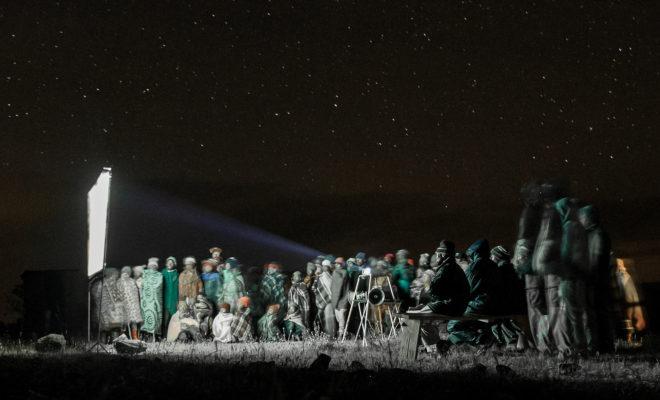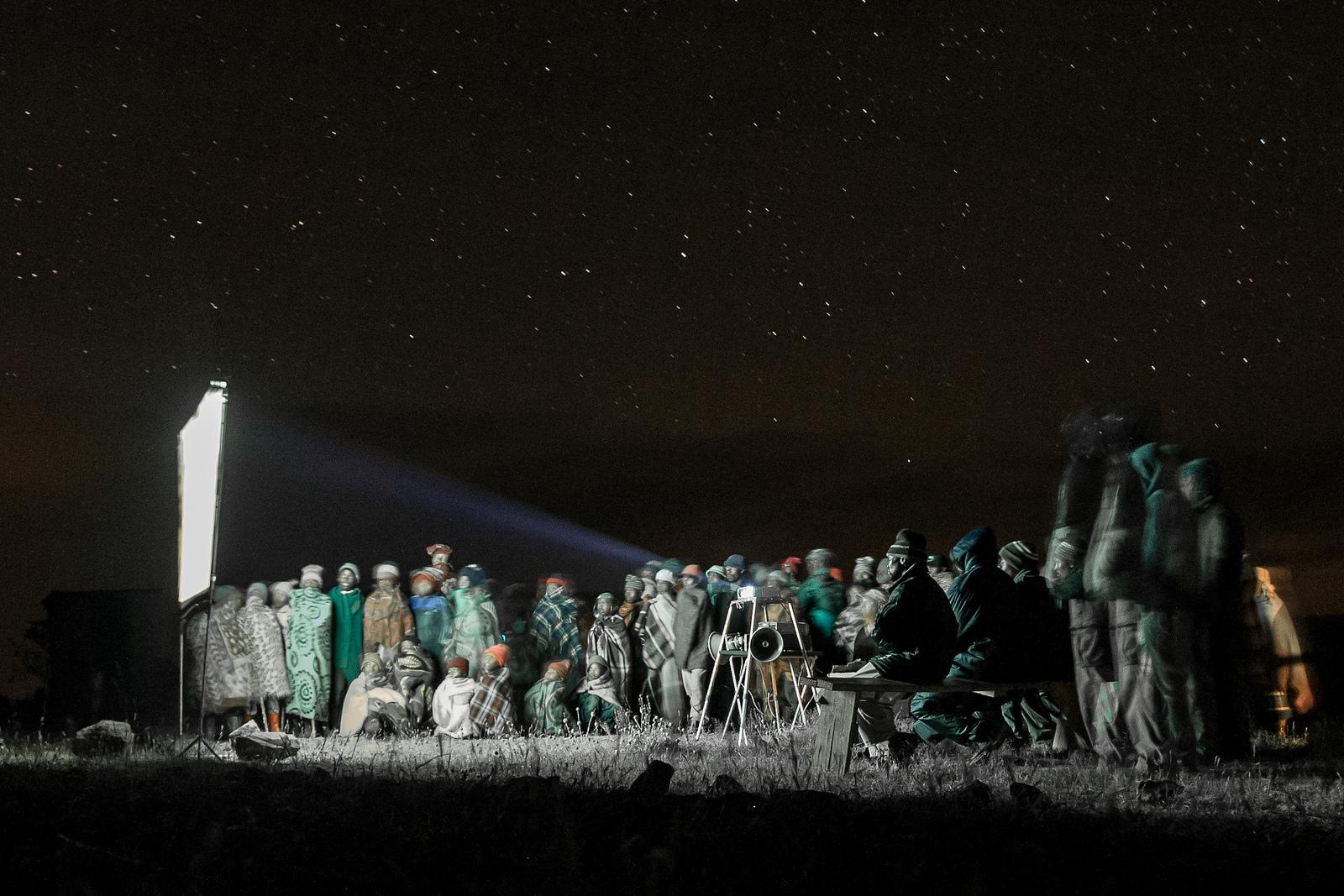Lesotho’s night before the elections: Photo of the Week/Explainer


In the pitch black of night, people gather to watch a film under the stars in Lesotho. Photograph taken by Daniel Weber.
Lesotho, the mountainous kingdom surrounded by South Africa, heads to the polls on Saturday 3 June.
It will vote in a snap general election called by Prime Minister Pakalitha Mosisili, 72. This move was prompted after he lost a vote of no confidence, which brought to an end his fractious seven-party coalition government. It had lasted less than two years.
This will be Lesotho’s third election since 2012. Once again, tensions are high. Strong rhetoric has been employed by both sides, and the army has had to deny that it is preparing to intervene.
How we got here
In order to understand the past few years of political turmoil in Lesotho and what’s at stake in the upcoming elections, one needs to go back to 2012. In elections that May, the incumbent Prime Minister Mosisili won the most seats. However, his party fell short of a majority and Mosisili failed to form a government.
Instead, several opposition parties grouped together under a coalition. Led by Thomas Thabane, 78, this new power-sharing government was welcomed with optimism both inside and outside the kingdom. This was Lesotho’s first peaceful transfer of power and first ruling coalition.
However, hope in a more peaceful and mature politics taking root in Lesotho soon dissipated. Thabane’s government was fraught with in-fighting and internal tussles for power. Just two years in, the tempestuous alliance fell apart and the PM fled the country following what he claimed was an attempted coup in August 2014.
Following a South African-led mediation, fresh elections were scheduled for February 2015. It was hoped that these would bring an end to the political crisis.
In these polls, Mosisili’s Democratic Congress (DC) won the most seats once again. But this time around, he managed to put together a government in the form of an unwieldy seven-party alliance.
This was Lesotho’s second coalition government. It crumbled even quicker than its first.
Towards the end of 2016, one of Mosisili’s closest deputies, Monyane Moleleki, defected from the ruling DC. He set up his own party, the Alliance of Democrats (AD), and joined forces with Thabane’s opposition All Basotho Convention (ABC).
Together, these opposition partners led a vote of no confidence in PM Mosilili. It carried in March paving the way for tomorrow’s elections.
Here we go again
The choice facing voters on 3 June will be a familiar one. Once the votes are tallied and the 120 seats in the National Assembly are distributed, the person to form a government will almost certainly be either Mosisili or Thabane.
There’s also a good chance Lesotho will get another coalition, something for which both front-runners are preparing. Mosisili’s DC has joined forces with the Lesotho Congress for Democracy (LDC), led by Deputy Prime Minister Mothetjoa Metsing, and the Popular Front for Democracy (PFD). These three parties have agreed not to run candidates in the same constituencies.
Opposition parties are also coordinating, but have found the process more fraught. Before the election was called, an alliance collaborated effectively in engineering the no-confidence motion. The opposition hoped this would see Mosisili step down and it was agreed that, in this eventuality, the premiership for the remaining three years of his term would be shared. Moleleki would be PM for the first 18 months, followed by Thabane for the remainder.
However, Mosisili thwarted this plan by resorting to a constitutional provision that allows a prime minister to advise the King to dissolve parliament and organise elections.
Since the snap election was called, the opposition has found coordinating more difficult. To begin with, Thabane rejected an electoral pact, saying his ABC party was aiming to win all constituencies itself. He said he would only form a coalition government if he failed to win a majority.
This contributed to some opposition parties’ feelings of not being treated as equals. Two pulled out of an opposition alliance before striking a compromise.
Eventually, four opposition parties agreed to coordinate efforts in six constituencies in which party leaders are up for election. Where leaders of their main rivals parties – namely Mosisili and Metsing – are running, the opposition will field a single candidate; where the leaders of their own parties are running, their coalition partners will step back.
Electioneering
In this election campaign, it seems that the main concern for politicians has been electioneering itself. Lesotho suffers from high unemployment, particularly among the youth. Over 20% of its adult population is suffering from HIV. It is ranked 160 out of 188 countries on the Human Development Index.
But solutions to these issues have not emerged in this election. Lip service has been paid to Lesotho’s social and economic challenges, but ideas and policies have not been at the forefront of the campaign.
More typical in the coverage have been accusations, such as PM Mosisili’s allegation that voters being targeted by civil society education programmes “were likely to not only be educated on how they should vote but who to vote for”. Or Thabane’s provocation that: “When we form government after next month’s elections, I don’t want to see any thieves and rapists doing as they please to innocent and vulnerable Basotho. That should end together with Ntate Mosisili and Ntate Metsing’s regime.”
Given this, and the fact that many politicians are more preoccupied with jockeying for position within coalitions rather than the issues at hand, it is little surprise Leostho’s political class is viewed highly negatively.
In a 2015 Afrobarometer study, for instance, 82% of respondents in Lesotho said they thought their political leaders were motivated “more to serve their own political ambitions” than the people. Lesotho ranked third worst in the 36 countries surveyed.
When Lesotho heads to the polls this Saturday, it will be the country’s third general elections since 2012. However, it is unlikely to be the third time too many of Lesotho’s 1.2 voters are actually voting. Turnout in 2015 was below 50%.
It may be a close run contest with much at stake for the so-called “kingdom in the sky”. But with the electorate’s choice being between two tried, tested and untrusted prime ministers and two different shaky coalitions, it seems unlikely many more voters will be inspired to turn out this time around.

At the final rally of Thomas Thabane, supporters come dressed in colours of their political party. One man turned plastic bags into a costume. Photograph taken and submitted by Justice Kalebe.
In our Photo of the Week, we showcase one of the boldest and most beautiful images, old or new, that we’ve come across that week. Sometimes weird things happen though and Photo of the Week turns into an explainer on upcoming elections. If you’d like to submit a photograph to be featured, please email [email protected].





